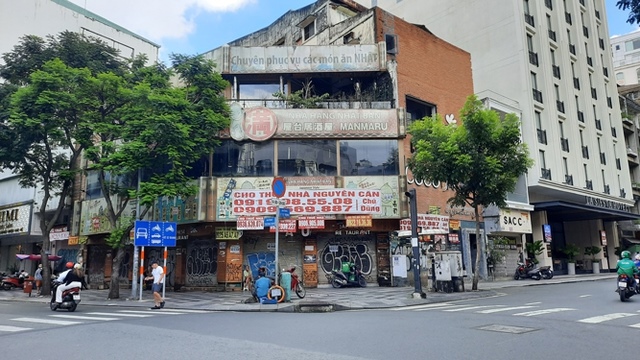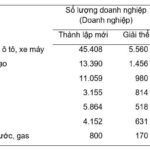At the end of August 2024, many people were surprised by the news that Starbucks had closed its most premium store in Ho Chi Minh City, located at 11-13 Han Thuyen, District 1, after seven years of operation and consistently high customer traffic. What shocked people even more was that Starbucks returned the premises after their contract ended and the landlord increased the rent from 700 million to 750 million VND per month, or about 9 billion VND per year.
**Racing to Return Prime Real Estate**
For business owners and those working in the real estate rental industry, the rental price of the above-mentioned premises is not considered too high.
In reality, there are other premises on the same Han Thuyen street or on adjacent streets that have much higher rents. For example, the premises occupied by %Arabica Coffee, a famous Japanese coffee chain that just opened a few months ago, rents for no less than 700 million VND per month.

A prime piece of real estate in the center of Ho Chi Minh City has been vacant for many years. Photo: PHAM DINH |
However, these ultra-luxury premises are only suitable for businesses with specific strategies. For enterprises solely aiming to profit from product sales and services, it would be very challenging to sustain such high rental costs.
A few months before the closure of Starbucks Han Thuyen, a series of famous brands such as Highlands Coffee returned their premises at the corner of Nguyen Du and Pasteur streets; YEN Shushi restaurant closed its branch at 8 Dong Khoi. MIA luggage and handbag store also vacated the premises at Phu Dong roundabout a few months ago. The rent for this location was also as high as 700 million VND per month, and four prominent brands had occupied it in just five years.
In reality, it is not new for businesses to return expensive premises during challenging economic times, as evidenced by the COVID-19 pandemic that began in 2020. According to the reporter of Nguoi Lao Dong Newspaper, there are still many premises along bustling streets in the center of Ho Chi Minh City, such as Nguyen Hue, Le Loi (District 1), Vo Van Tan (District 3), Nguyen Trai (District 5), Nguyen Van Linh (District 7), Phan Xich Long (Phu Nhuan District), etc., that are “closed and locked” without tenants or have been rented but continue to remain closed.
Le Loi Street (District 1), about 550 meters long, is one of the most beautiful streets in the city center, intersecting with “gold-plated” streets such as Pasteur, Nam Ky Khoi Nghia, and Nguyen Hue. However, there are currently about 15 vacant premises on this street. Ms. Nguyen Hanh, manager of a souvenir shop on this street, said that the reason many surrounding stores closed was that they could not afford the rent, which amounts to 25-30 million VND per day or 800-900 million VND per month, excluding personnel costs, taxes, and capital. Some store owners initially did not anticipate the business situation and rented premises beyond their capacity, leading to insufficient revenue to cover expenses. As a result, they had to close and rent elsewhere, even though they had only moved in a few months ago.
“A precious stone jewelry store, the famous tea chain P.L, and a travel agency have all left due to unaffordable rental costs. So far, no one has dared to rent because the price is too high. I am also asking the landlord to reduce the rent because, although there are many tourists, not many of them are buying. I don’t know if I can hold on until next year,” Ms. Hanh worriedly shared.
Mr. Hoang Thanh, the broker for the property at 48 Le Loi, a 1-ground-floor-1-floor structure, said the owner offered the property at 12,000 USD/month (nearly 300 million VND). The conditions were a 4-month deposit, 2-month advance payment, and a minimum lease of 2 years. Notably, this property has been vacant for more than a year since the T.T watch store “ran away,” but the owner refuses to lower the rent.
“If customers want to rent a premises on Le Loi Street for business or branding purposes, they should consider carefully because the price is very high, ranging from 10,000 to 12,000 USD/month. Many customers have been unable to afford this rental fee and have had to give up their deposits, amounting to hundreds of millions of VND,” Mr. Thanh informed.
Nguyen Trai Street (District 5) used to be known as the “fashion street” of Ho Chi Minh City, with hundreds of shops selling various items such as shoes, clothes, bags, hats, and glasses. However, due to sluggish sales and astronomical rental costs, many businesses have put up liquidation notices and offered to transfer their premises.
Ms. Pham Ngoc, the representative of the M.d.l maternity dress design store, said she wanted to transfer the premises of 14.5 m2, with a usable area of 35 m2, including one floor, one ground floor, and a small warehouse, for a rent of 60 million VND/month and a transfer price of 259 million VND (including air conditioning, lights, signboards, deposits, etc.) to switch to another industry. “Sales in the fashion industry are declining, while rental prices are high and do not match the market. After several unsuccessful negotiations, I decided to transfer the lease,” Ms. Ngoc explained.
Ms. Ha Phuong, owner of the N.N fashion store nearby, also said she wanted to liquidate all goods and rent out the ground floor area of 80 m2 because she is “retiring.” The current rent is 45 million VND/month, and the minimum lease is 1 year with a 2-month deposit. Renting this space would save costs on shelves and counters. However, according to our findings, Ms. Phuong is retiring and returning the premises because the landlord refuses to lower the rent to support the business and continues to increase it annually.
**Rather Leave Vacant Than Lower Rent!**
As a tenant, Ms. Le Thi Tu Uyen, who specializes in selling environmentally friendly consumer goods and clean food, once rented a premises on Nguyen Hue Street, District 1, for 20 million VND/month but closed it after only three months, despite losing her deposit. The reason was that, although this street is bustling with people, they are mostly young people with moderate spending power. As a result, the revenue was not enough to cover expenses.
Subsequently, Ms. Uyen focused on developing her online channel and found that spending only about 200,000 VND/day, or about 6 million VND/month, on advertising would reach about 40,000 people. With a 0.5% “order closing” rate, the store received 200 orders/month. Online stores can reach customers nationwide and target the right audience with artificial intelligence (AI), effectively converting views into orders. “The current retail space rent is unreasonably high. The development of online channels will significantly reduce rental prices and bring them back to their actual value,” Ms. Uyen predicted.
Recently, a high-end food chain in Ho Chi Minh City closed its first store, which had been operating for more than ten years, on Nguyen Dinh Chieu Street, District 3, because the landlord “requested an unreasonable rent increase.” The founder of this brand shared that the premises were less than 40 m2, very old, with air conditioning frequently breaking down and water leakage during rains, and difficult to renovate due to shared walls with the neighboring store. However, the rent was as high as 60 million VND/month.
After more than three months of closing the aforementioned food store, the premises are still vacant and have not found a new tenant. “With such a rental price and the condition of the premises, only ‘big guys’ with deep pockets who rent for branding purposes or those with a ‘death wish’ can afford it. Regular businesses cannot sustain such high costs,” the representative of this retail chain commented.
F&B industry expert Mr. Hoang Tung, Chairman of F&B Investment & FoodEdu Academy, said that although the online channel is developing rapidly, its contribution to revenue is still insignificant, and the main source of income remains the offline channel. Therefore, business premises are still crucial in the F&B industry. “Not only are prime locations becoming more expensive due to their scarcity, but regular business premises are also showing a tendency to increase in price,” he assessed.
Mr. Tung believes that, according to convention, landlords always have the upper hand as they require tenants to make deposits, pay in advance, and increase prices annually or periodically to compensate for inflation. Most landlords are financially stable and can afford to leave their properties vacant for six months to a year to maintain their asking price, resolutely refusing to lower the rent. “Regarding premises, it’s already good if the rent remains stable. There is little hope for a reduction. F&B store owners must consider this as part of their cost structure before starting a business,” Mr. Tung advised.
Meanwhile, Mr. Nguyen Hong Hai, Chairman of VNO Investment and Development Joint Stock Company, specializing in rental and subletting services, opined that businesses’ closure and return of premises are not necessarily due to high rents but could be because they no longer have a need or see the business as unviable in the future.
**Prime Locations Still Attract Renters**
According to an F&B industry expert, prominent coffee and beverage chains that heavily invest in prime locations include Katinat Coffee & Tea, Phe La, Phuc Long, and Highland. However, Katinat Coffee & Tea and Phe La belong to the same owner. Perhaps the owner’s goal in aggressively developing this chain is to sell shares or achieve other objectives rather than solely focusing on profit, so it cannot be compared with other brands operating for regular business purposes.
In reality, rental prices tend to increase rather than decrease in areas where premises are scarce, such as prime locations in District 1, the premises on Han Thuyen Street that Starbucks recently vacated, and those around Ho Con Rua roundabout. Major F&B brands and chains are always on the lookout for opportunities to rent these locations.
NHOM PHONG VIEN
Prime Minister Postpones Meeting with Chairmen and CEOs of Vingroup, Sungroup, Masan Group, FPT, Hoa Phat, THACO, and T&T on September 12th.
The Prime Minister is keen to host a conference focused on collaborating with private corporations to address challenges in business operations and stimulate economic growth. The aim is to create a platform to discuss strategies for unblocking major projects, fostering a stable macroeconomic environment, and promoting a thriving business landscape.
The Evolution of Starbucks: A Tale of Two Cities
Starbucks enthusiasts were saddened by the closure of the Reserve Han Thuyen location on August 26. However, many Starbucks stores in District 1 had ceased operations prior to this, an unfortunate reality for coffee lovers in the area.



















